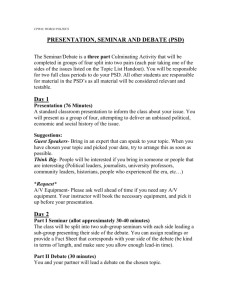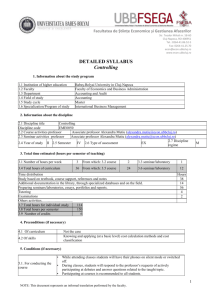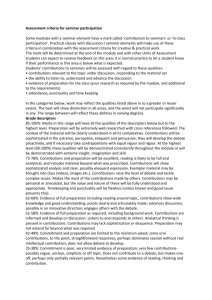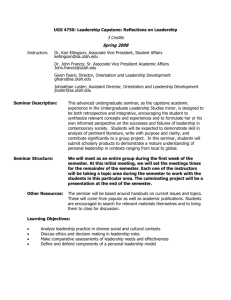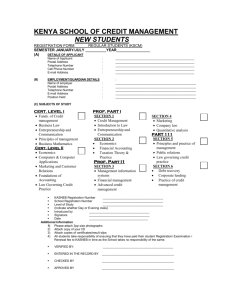Discipline sheet
advertisement
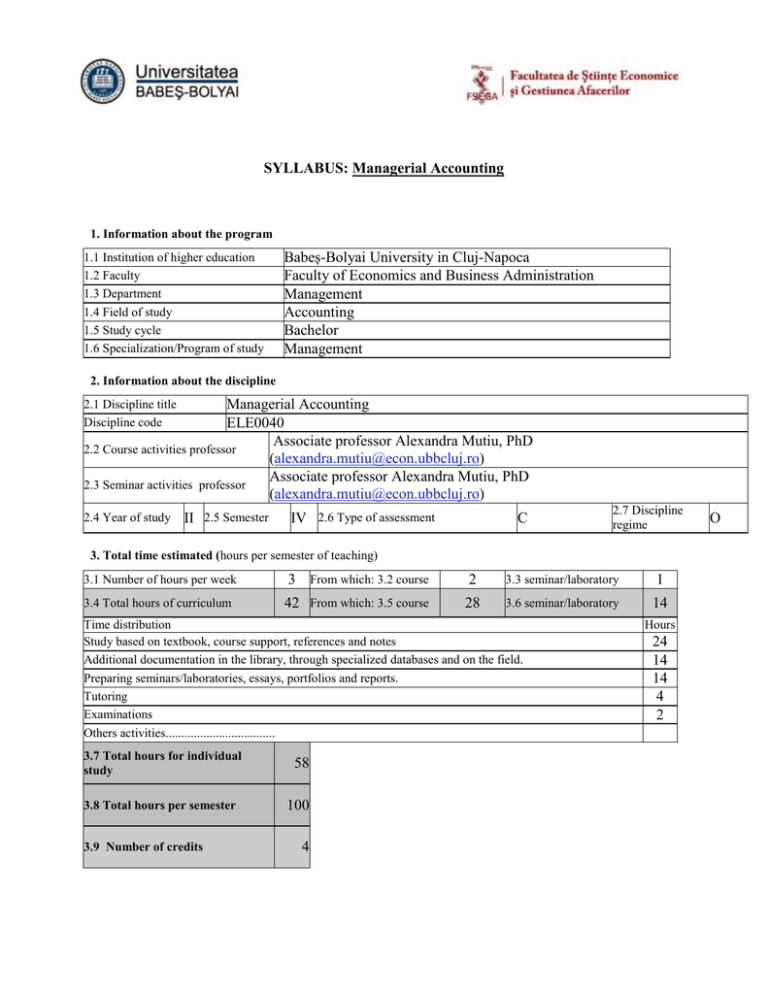
SYLLABUS: Managerial Accounting 1. Information about the program 1.1 Institution of higher education 1.2 Faculty 1.3 Department 1.4 Field of study 1.5 Study cycle 1.6 Specialization/Program of study Babeș-Bolyai University in Cluj-Napoca Faculty of Economics and Business Administration Management Accounting Bachelor Management 2. Information about the discipline Managerial Accounting ELE0040 Associate professor Alexandra Mutiu, PhD 2.2 Course activities professor (alexandra.mutiu@econ.ubbcluj.ro) Associate professor Alexandra Mutiu, PhD 2.3 Seminar activities professor (alexandra.mutiu@econ.ubbcluj.ro) 2.1 Discipline title Discipline code 2.4 Year of study II 2.5 Semester IV 2.6 Type of assessment C 2.7 Discipline regime 3. Total time estimated (hours per semester of teaching) 3.1 Number of hours per week 3 From which: 3.2 course 2 3.3 seminar/laboratory 1 3.4 Total hours of curriculum 42 From which: 3.5 course 28 3.6 seminar/laboratory 14 Time distribution Study based on textbook, course support, references and notes Additional documentation in the library, through specialized databases and on the field. Preparing seminars/laboratories, essays, portfolios and reports. Tutoring Examinations Others activities................................... 3.7 Total hours for individual study 3.8 Total hours per semester 3.9 Number of credits 58 100 4 Hours 24 14 14 4 2 O 4. Preconditions (if necessary) 4.1 Of curriculum Not 4.2 Of skills the case Knowing and applying (at a basic level) cost calculation methods and cost classification 5. Conditions (if necessary) 5.1. For conducting the course 5.2. For conducting the seminar/laboratory • While attending classes students will have their phones on silent mode or switched off. • During classes, students will respond to the professor’s requests of actively participating at debates and answer questions related to the taught topic. • Participating at courses is recommended to all students. • Participating at seminars is recommended to all students. • At the beginning of each seminar students will be asked to present homework that was assigned during previous seminars. • During classes students are encouraged to solve case studies and to answer questions related to the taught topic. 6. Acquired specific skills Professional skills • • • • • Carrying out the financial-accounting activity at economic entities level, public institutions and other non-profit organizations Applying recording techniques and operational procedures specific to financial and management accounting Participating in the development and implementation of software for financial accounting Preparing the financial statements, synthesis documents, reporting statements and analyzes to different bodies as well as analyzes, summaries, forecasts and economic evaluation Assisting management in decision making 7. Course objectives (arising from the acquired specific competence grid) 7.1 Discipline’s general objective • Developing and deepening the abilities that an accountant requires in order to compute costs and to take decisions 7.2 Specific objectives • Approaching some basic controlling concepts, principles, procedures and rules of managerial accounting; • Forming the necessary abilities in order to perform management accounting within economic entities; • Grounding students’ scientific knowledge towards the development of sound authentic professional judgment; • Developing the habit of objective assessment and selfassessment by using proper methods; • Developing students’ ability to comprehend the complexity of managerial accounting’s activities; • Stimulating students’ individual study; 8. Contents 8.1 Course Teaching methods The nature, source and purpose of management information Cost accounting techniques Budgeting Standard costing Performance measurements and control Enhanced lecture, debate Enhanced lecture, debate Enhanced lecture, debate Enhanced lecture, debate Enhanced lecture, debate Observations 2 lecture 6 lectures 2 lectures 2 lectures 2 lectures References: 1. Hilton R.W., Managerial Accounting – creating value in a dynamic business environment, McGraw- Hill, 8th Edition, 2009 2. Horngren C.T., Sundem G.L., Stratton W.O., Burgstahler D., Schatzberg J., Introduction to Management Accounting, 15 th Edition, Prentice Hall, 2011 8. 2 Seminar/laboratory Teaching methods The nature, source and purpose of management information Enhanced lecture, debate Enhanced lecture, debate Enhanced lecture, debate Enhanced lecture, debate Enhanced lecture, debate Cost accounting techniques Budgeting Standard costing Performance measurements and control Observations 2 lecture 6 lectures 2 lectures 2 lectures 2 lectures References: 1. Hilton R.W., Managerial Accounting – creating value in a dynamic business environment, McGraw- Hill, 8th Edition, 2009 Horngren C.T., Sundem G.L., Stratton W.O., Burgstahler D., Schatzberg J., Introduction to Management Accounting, 15 th Edition, Prentice Hall, 2011 9. Corroboration / validation of the discipline content according to the expectations coming from representatives of the epistemic community, of the professional associations and of the representative employers in the program’s field. In order to establish the formative contents for this class we considered the educational standards particular to the field of accounting being issued by the IASB, the ACCA syllabus, as well as the requirements of national professional bodies (CECCAR) regarding the access to the profession of certified accountant. The conclusions being reached through debates with representatives of the business environment, as potential employers in the region where our graduates come from, were also taken into consideration. 10. Evaluation (assessment) Type of activity 10.1 Evaluation criteria 10.2 Assessment methods 10.4 Course • The ability to apply concepts, A final written exam in the techniques and methods that were exam session. covered during the semester • The ability to analyze companies’ The exam consists in financial statements and other solving case studies and reporting documents and ground answering theoretical decisions questions. • The ability to argue for the decision being made Any attempt to fraud or found fraud during the written exam is sanctioned through failure to pass the exam and the student can be expelled. 10.3 Percentage in the final grade 60% • Active participation in debates 10.5 Seminar/laboratory Students will be graded during the semester when engaging in discussions in a constructive manner. A minimum of three interventions is required in order to obtain the maximum points for this activity. 10% • The ability to understand Students will be graded concepts, techniques and during the semester when methods that were covered solving exercises (at the during the semester blackboard), when engaging into discussions in a • The ability to apply concepts, techniques and methods that were constructive manner, when offering well grounded covered during the semester answers as well as when • The ability to argue and asses their own and others arguments turning in homework assigned during previous seminars. 30% 10.6 Minimum standard of performance • The ability to understand and apply concepts, techniques and methods that were covered for the course and seminar Date of completion Signature of the course professor Signature of the seminar professor 07.09.2012 Mutiu Alexandra Ileana Mutiu Alexandra Ileana Department’s approval date ............................................ Head of Department’s Signature ..............................................................
